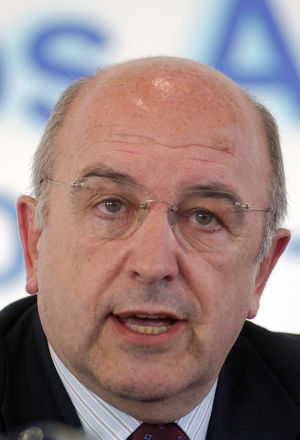Joaquín Almunia
(union leader, politician) | ||||||||||||||||||||||||||||||||
|---|---|---|---|---|---|---|---|---|---|---|---|---|---|---|---|---|---|---|---|---|---|---|---|---|---|---|---|---|---|---|---|---|
 | ||||||||||||||||||||||||||||||||
| Born | Joaquín Almunia Amann 17 June 1948 Bilbao, Spain | |||||||||||||||||||||||||||||||
| Nationality | Spanish | |||||||||||||||||||||||||||||||
| Ethnicity | Jewish | |||||||||||||||||||||||||||||||
| Alma mater | University of Deusto, Practical School for Advanced Studies, Harvard/Kennedy School | |||||||||||||||||||||||||||||||
| Member of | Centre for European Reform, European Council on Foreign Relations, Friends of Europe | |||||||||||||||||||||||||||||||
| Party | PSOE | |||||||||||||||||||||||||||||||
Spanish politician, European Commissioner for 10 years, 6 Bilderbergs
| ||||||||||||||||||||||||||||||||
Joaquín Almunia Amann is a Spanish politician who later was chosen to hold several positions in the European Commission. He is a multi-Bilderberger.
During his tenure in the two Barroso Commissions, he was European commissioner responsible for economic and monetary affairs (2004–2009) and, subsequently, vice-president and the European Commissioner for Competition (2009–2014), where he stalled an antitrust investigation into Google.
Contents
Background
He was born in Bilbao on 17 June 1948 to a bourgeois family, son to an engineer (father) of Valencian origin and his mother the daughter of a German physician of Jewish ancestry.[1] His grandfather Isaac Amann was one of the promoters of the Bilbao–Getxo railway.[1]
Education
Almunia attended the Jesuit School of Indautxu in Bilbao.[1] He graduated with degrees in economics and law in 1971 and 1972, respectively, from the also Jesuit University of Deusto in Bilbao, and completed follow-up studies at the École pratique des hautes études in Paris, from 1970 to 1971. He also completed a program at the Harvard Kennedy School at Harvard University for senior managers in government in 1991. He was an associate lecturer on employment and social security law at the University of Alcalá de Henares from 1991 to 1994.[2]
Career
Almunia was chief economist of the Unión General de Trabajadores (UGT), a trade union linked to the Spanish Socialist Workers' Party (PSOE), from 1976 to 1979. He was economist at the Council Bureau of the Spanish Chambers of Commerce in Brussels from 1972 to 1975.
Almunia was a member of the Congress of Deputies from 1979 to 2004, representing Madrid. He was Minister of Employment and Social Security of the Government of Spain from 1982 to 1986 and Minister of Public Administration from 1986 to 1991. He was replaced by Juan Manuel Eguiagaray in the latter post.[3] He was also the PSOE spokesperson from 1994 to 1997.
Upon the resignation of Felipe González after being defeated in the 1996 elections, the PSOE appointed Almunia as the party leader (Secretary-General), a position he held from 1997 to 2000. He attended the 1998 Bilderberg meeting. In 2000, Almunia was PSOE candidate for prime minister. The party was again defeated by incumbent Prime Minister José María Aznar of the conservative PP.
During his tenure in the two Barroso Commissions, he was European commissioner responsible for economic and monetary affairs (2004–2009) and, subsequently, vice-president and the European Commissioner for Competition (2009–2014),[4] where he stalled an antitrust investigation into Google.[5]
Spied upon by NSA
The US National Security Agency (NSA) tapped the cellphone of European Commission Vice President Joaquín Almunia between 2008 and 2009, when he was commissioner for economic and monetary affairs. Alumnia’s calls and text messages were monitored at the end of 2008 and early 2009 by not only the NSA but also Britain’s intelligence service GCHQ.[6]
Deep state connections
Almunia studied at the Harvard/Kennedy School, a known recruitment ground for the CIA.
He is a member of the Centre for European Reform, European Council on Foreign Relations, Friends of Europe,Centre for European Policy Studies, The European House – Ambrosetti[7], and Jacques Delors Institute.
Events Participated in
| Event | Start | End | Location(s) | Description |
|---|---|---|---|---|
| Bilderberg/1998 | 14 May 1998 | 17 May 1998 | Scotland Turnberry | The 46th Bilderberg meeting, held in Scotland, chaired by Peter Carrington |
| Bilderberg/2005 | 5 May 2005 | 8 May 2005 | Germany Rottach-Egern | The 53rd Bilderberg, 132 guests |
| Bilderberg/2008 | 5 June 2008 | 8 June 2008 | US Virginia Chantilly | The 56th Bilderberg, Chantilly, Virginia, 139 guests |
| Bilderberg/2010 | 3 June 2010 | 6 June 2010 | Spain Hotel Dolce Sitges Barcelona | The 122 guests met in the Hotel Dolce Sitges, Barcelona, Spain. |
| Bilderberg/2011 | 9 June 2011 | 12 June 2011 | Switzerland Hotel Suvretta St. Moritz | 59th meeting, in Switzerland, 129 guests |
| Bilderberg/2012 | 31 May 2012 | 3 June 2012 | US Virginia Chantilly | The 58th Bilderberg, in Chantilly, Virginia. Unusually just 4 years after an earlier Bilderberg meeting there. |
| WEF/Annual Meeting/2008 | 23 January 2008 | 27 January 2008 | World Economic Forum Switzerland | At the 2008 summit, Klaus Schwab called for a coordinated approach, where different 'stakeholders' collaborate across geographical, industrial, political and cultural boundaries." |
| WEF/Annual Meeting/2009 | 23 January 2009 | 27 January 2009 | World Economic Forum Switzerland | Chairman Klaus Schwab outlined five objectives driving the Forum’s efforts to shape the global agenda, including letting the banks that caused the 2008 economic crisis keep writing the rules, the climate change agenda, over-national government structures, taking control over businesses with the stakeholder agenda, and a "new charter for the global economic order". |
| WEF/Annual Meeting/2013 | 23 January 2013 | 27 January 2013 | World Economic Forum Switzerland | 2500 mostly unelected leaders met to discuss "leading through adversity" |
| WEF/Annual Meeting/2014 | 22 January 2014 | 25 January 2014 | World Economic Forum Switzerland | 2604 guests in Davos considered "Reshaping The World" |
References
- ↑ a b c https://elpais.com/diario/2000/02/13/espana/950396409_850215.html
- ↑ http://ec.europa.eu/commission_2010-2014/almunia/about/cv/index_en.htm%7Cpublisher=European Commission
- ↑ M. Cejudo, Guillermo (March 2007). New Wine in Old Bottles: How New Democracies Deal with Inherited Bureaucratic Apparatuses. The Experiences of Mexico and Spain
- ↑ https://web.archive.org/web/20120229173707/http://www.euronews.net/2009/11/27/barroso-names-new-eu-commission-team/
- ↑ https://www.politico.eu/article/meps-to-question-almunia-about-delays-in-google-case/
- ↑ https://english.elpais.com/elpais/2013/12/20/inenglish/1387557338_076107.html
- ↑ Minutes of the 2135th meeting of the Commission held in Brussels (Berlaymont) on 15 July 2015 European Commission.